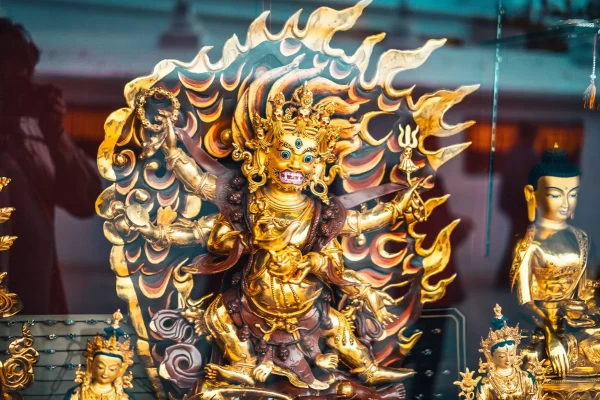Tiji Festival: Celebrating Good over Evil

In the Upper Mustang, the spring comes with the sound of drums beating for the masked monks out in the street marking the celebration of the Tiji ‘Tenchi’ festival. The remote region bordering Tibet lights up with colorful religious dresses, masks, and dances circling the stone streets and the courtyards of the Mustang Royal Palace.
Thousands of years ago, as the legends recite, the Mustang region was invaded and attacked by a demon. Dorje Jono, also called Vajrakila or Vajrakumar, came to the kingdom as a reincarnation of Lord Buddha. He is a deity in Vajrayana Buddhism. Guru Rimpoche or Padmasambhava, the tantric master of the 8th century, introduced the Vajrakila practice of 3 days for Dorje Jono to fight the demon to rescue the kingdom and its people.
400 years ago during the reign of King Samdup Rabten of Lo Manthang, late Sakya Trizin Ngawang Kunga Sonam, a scholar, was brought to cleanse the territory of demons in the 17th century. That was when the monks of Chhode Monastery brought this ritual back to practice, and ever since then, the Lo Manthang kingdom has dedicated 3 days of spring to celebrate the victory of good over evil and to promote well being of all living beings of Mustang.
Every year in the month of April or May, the Tiji Festival falls on 3 days according to the Tibetan Lunar Calendar. The monks perform the Vajrakila practice like it is being done for centuries and the moment of the vanquishing of the demon is reenacted in the streets. The practice is a form of meditation based on the tantras of the myth.
The dances are a combination of peaceful meditation forms to rejuvenate prosperity and push away all the negative energy from the region. Just like how Dorje Jana won over the evil demon back then, today, this festival is celebrated for all the ‘evil demons’ that live in the form of negative elements and emotions amongst the people and the villages.
People from all seven provinces of the Upper Mustang region come to Lo Manthang to participate and witness the auspicious celebration of this festival. The royal family of Mustang also join the monks and the local people on this bright occasion. Chanting prayers, performing dancing, singing, and feasting to honor their mighty and brave ancestors. The Tiji Festival is marked as one of the biggest festivals in the region.
